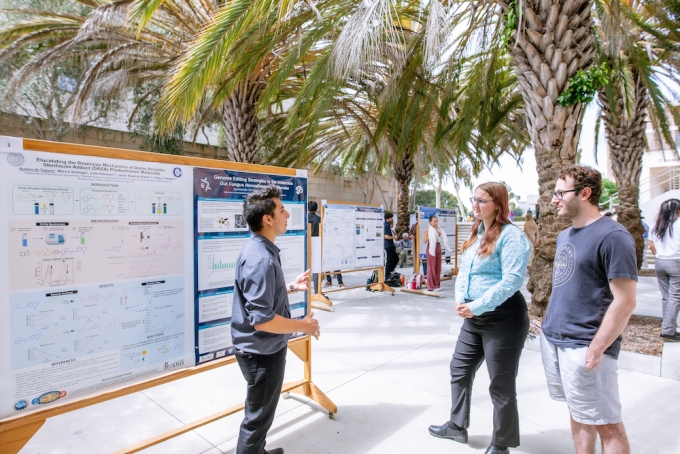Eddy Rao, a mechanical engineering major at UC Santa Barbara, spent the summer generating custom tungsten-copper composites. Working for materials PhD student Lauren Poole and her graduate advisor, materials professor Frank Zok, Rao analyzed data provided by state-of-the-art equipment in the campus’ shared-use facilities. The opportunity to engage in hands-on research for the soon-to-be sophomore was provided by EUREKA!, a program overseen by the Center for Science and Engineering Partnerships (CSEP) that is designed to enrich the academic experience of first-year undergraduates in science, technology, engineering, and mathematics (STEM) fields early in their academic careers.
“This was my first exposure to research,” said Rao. “I learned so much about the process of research, and I believe that my present-day skills and abilities reflect the increased confidence in myself that I have developed as a scientist and engineer.”
Rao was one of nearly eighty undergraduate students who participated in the CSEP Undergraduate Research Colloquium on August 17, showcasing their summer research to students, faculty, and guests. CSEP provides immersive, hands-on research experiences for undergraduate and community-college transfer students who have demonstrated the desire and the potential to become future scientific leaders. EUREKA! was one of a dozen participating training programs represented at the poster session, which include scholar programs across UCSB: Edison STEM, UCSB-Smithsonian, Society for Advancement of Chicano/Hispanics and Native Americans in Science (SACNAS) Scholars Program, PIPELINES, McNair Scholars Program, Cal-Bridge, University of California Leadership Excellence through Advanced Degrees (UC LEADS), Quantum Foundry Research Experiences for Undergraduates (REU), Physics REU, Maximizing Access to Research Careers (MARC), and Beckman Scholars. In addition to training in independent research projects, programs provided opportunities for scholars to network with industry and academia, and develop important professional skills, including scientific communication.
“We organize this event to create a vibrant poster session, where undergraduates, faculty, and researchers from across disciplines can exchange ideas in a diverse and supportive environment,” explained Wendy Ibsen, CSEP associate director and undergraduate coordinator for UCSB’s Quantum Foundry. “These scholars experience a larger, conference-like environment, taking another important step toward becoming professional scientists.”
As a Quantum Foundry intern, Andrew Allison investigated the material absorption of aluminum-gallium-arsenide ring resonators in the lab of Galan Moody, an associate professor of electrical and computer engineering. Allison, a physics major, enjoyed the hands-on experience of learning how to solve a real-world problem without a clear path to follow.
“It was like being in the ‘wild West’ of technology,” said Allison, who transferred to UCSB from Santa Barbara City College. “The most rewarding and impactful part of my summer was my growth as a researcher and problem solver, especially since I had no prior experience in a lab.”
Added Jordan Brower, a third-year chemistry major and UC LEADS Scholar, “I love the work that I’ve been doing. It’s been a great hands-on opportunity to learn more about the field of chemistry and how research is done, as opposed to sitting in a classroom.”
Not every participant was new to undergraduate research. Fourth-year chemical engineering major Jessy Gonzalez has been doing research since his freshman year. He spent this summer working as a Beckman Scholar in the lab of chemical engineering professor Michelle O’Malley, whose group focuses on the biotechnological potential of unusual microbes from nature, which may have significant applications when it comes to renewable energy and manufacturing chemicals and drugs. The Beckman Program, run in partnership with CSEP, gave Gonzalez access to a network of investigators and scholars from the Arnold and Mabel Beckman Foundation and a closer look at what it takes to be a graduate student.
“This summer, I gained a lot more creative freedom to develop my own protocols and research project,” said Gonzalez. “It’s been a very rewarding experience to understand more about what a graduate student is and what they do. It provided invaluable insight to figure out that I want to pursue a PhD in the near future.”
Kai Lam, a third-year biology major, completed a trifecta of summer undergraduate research opportunities this summer. After participating in CSEP’s Summer Institute in Mathematics and Science (SIMS) and EUREKA! programs last year, he spent this summer in the MARC Program, which is funded by the National Institutes of Health to increase the number of highly trained biomedical scientists from underrepresented minority groups. Lam said his summer experiences have been life changing.
“CSEP gave me a chance to pursue science and feel comfortable talking about my work and sharing my ideas,” said Lam, who described himself as extremely timid. “I’ve learned to step out of my comfort zone, which is a huge step for me. These programs have helped me tremendously academically and to become the stronger and more confident person that I am today.”
The colloquium served as the culmination of work from many programs and research labs across campus, and it showcased the achievements of these researchers and the dedication that training programs and mentors from across campus have for young and inspiring scholars.

UC Santa Barbara chemical engineering major Jessy Gonzalez explains his summer research project during a poster session sponsored by the Center for Science and Engineering Partnerships (CSEP).
